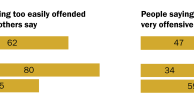Large shares of Americans say there is at least some discrimination against several religious, racial and ethnic groups in our society. About eight-in-ten see discrimination against Muslims and Jews, as well as against Arab, Black and Hispanic people.
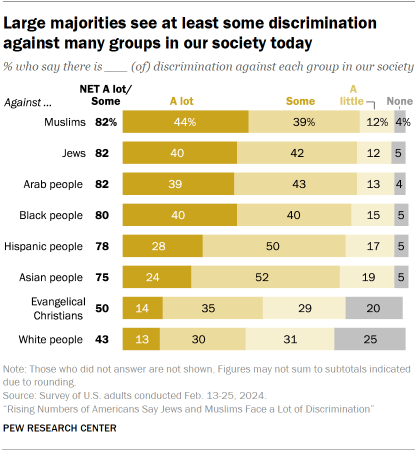
Three-quarters also see at least some discrimination against Asian people.
Half or fewer see at least some discrimination against evangelical Christians and White people.
The shares of Americans who say there is a lot of discrimination against each group vary considerably. Muslims are most widely perceived to face a high degree of discrimination: 44% of U.S. adults say there is a lot of discrimination against Muslims, which is slightly more than the shares saying this about Black people (40%), Jews (40%) and Arab people (39%). Somewhat fewer think there is a lot of discrimination against Hispanic people (28%) and Asian people (24%). Americans are least likely to say there is a lot of discrimination against evangelical Christians (14%) and White people (13%).
Age
Across all age groups, solid majorities see at least some discrimination against Muslim, Jewish, Arab, Black, Hispanic and Asian people.
Young adults (ages 18 to 29) stand out for being more likely than older adults to perceive a lot of discrimination against certain groups. This is particularly the case when it comes to Black people: 51% of adults under 30 say there is a lot of discrimination against Black people in our society, while about a third of those ages 65 and older say the same (34%). This pattern holds for perceptions of discrimination against Muslims, Arab, Hispanic and Asian people.
But younger adults are much less likely than older people to perceive a lot of discrimination against Jews. Of all the age groups analyzed, adults 65 and older are the most heavily inclined to say there is a lot of discrimination against Jews in our society today (50%), while adults under 30 are the least likely to say this (31%). Younger adults are also less likely than older people to say there is a lot of discrimination against evangelical Christians and White people.
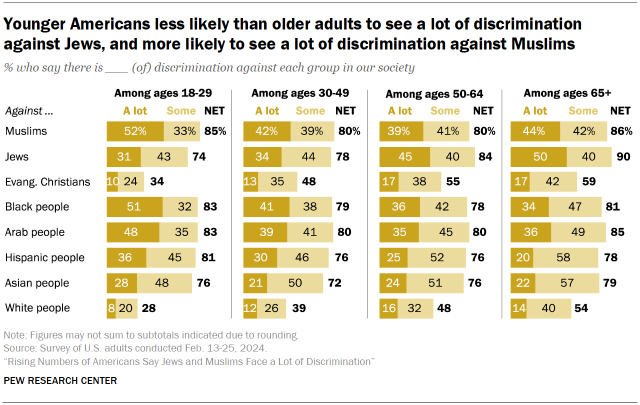
Partisanship
Two-thirds or more of Republicans and Democrats see at least some discrimination against Jewish, Muslim, Black, Hispanic, Asian and Arab people.
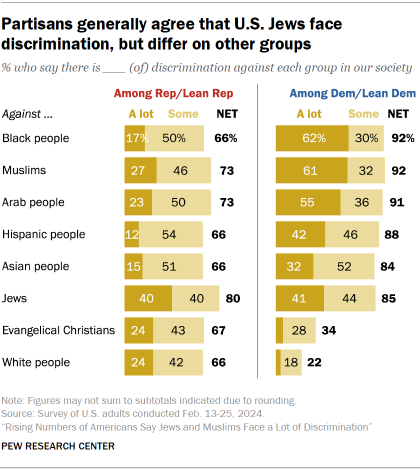
Still, the party coalitions diverge when it comes to which of those groups experience a lot of discrimination. For example, Democrats and Democratic-leaning independents are 45 percentage points more likely than Republicans and Republican leaners to say there is a lot of discrimination against Black people.
Democrats are also more likely than Republicans to say there is a lot of discrimination against Muslim, Arab, Hispanic and Asian people.
On the other hand, Republicans are more likely than Democrats to see discrimination against evangelical Christians and White people.
Only in the case of Jews do partisans on both sides largely agree: Four-in-ten Republicans and Democrats alike say Jews face a lot of discrimination in our society today.
Overall, Democrats are generally much more likely than Republicans to perceive a lot of discrimination against various groups. Aside from Jews (40%), no group is seen as facing a lot of discrimination by more than 27% of Republicans, whereas more than 40% of Democrats see a lot of discrimination against five of the listed groups.
Race and ethnicity
Among adults in each of four large racial and ethnic categories – White, Black, Hispanic and Asian Americans – about three-quarters or more say that Black, Hispanic and Asian people face at least some discrimination in our society today. Black Americans themselves are particularly likely to feel that Black people face a lot of discrimination (73% say this).
Roughly eight-in-ten or more Americans across all four racial or ethnic groups also feel that Muslims and Arab people face at least some discrimination.
White Americans are the most likely to say that Jews face at least some discrimination (85%). Slightly fewer Black (78%), Hispanic (75%) and Asian (71%) Americans express the same view.
Like the overall public, fewer people in most of these racial or ethnic groups think there is discrimination against evangelical Christians, though about half of White (52%), Black (51%) and Hispanic (46%) adults say there is at least some discrimination against evangelical Christians.
White adults are far more likely than any of the other racial or ethnic groups to feel there is at least some discrimination against White people (52%).
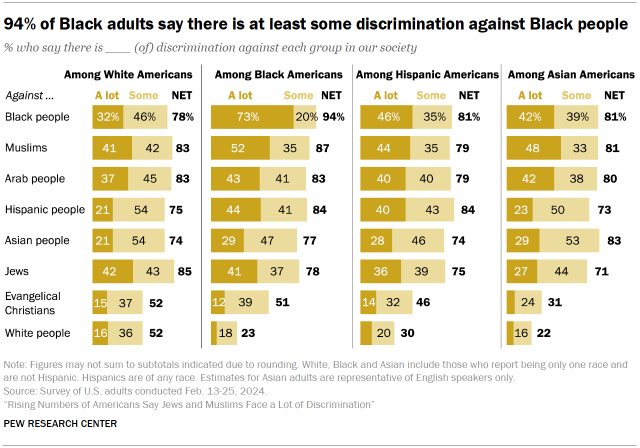
Religion
Religious groups differ significantly in their assessments of discrimination in our society. To begin with, each religious group tends to be especially likely to perceive discrimination against itself.
Take, for example, views of discrimination against Jews: 72% of Jewish Americans say there is a lot of discrimination against Jews in our society today, but fewer than half of adults in any other religious group in the survey say the same. Muslim Americans stand out for a particularly small share saying Jews face a lot of discrimination (17%).
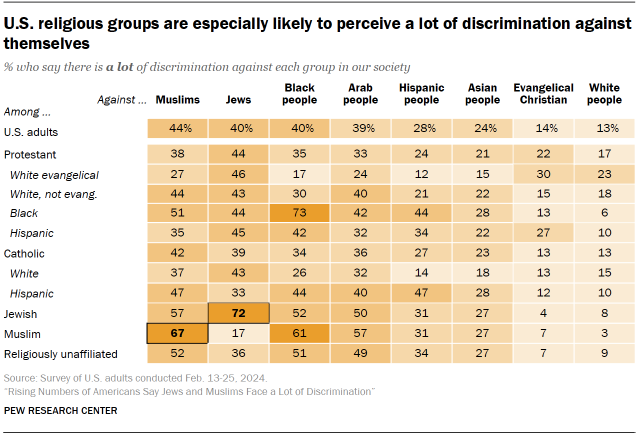
Similarly, Muslim Americans are significantly more likely than most other religious groups to say that Muslims face a lot of discrimination (67%). Still, around half or more of Jewish Americans (57%), religiously unaffiliated Americans (52%) and Black Protestants (51%) also perceive a lot of discrimination against Muslims. White evangelical Protestants (27%) are among the least likely to say Muslims face a lot of discrimination.
Indeed, White evangelical Protestants are as likely to say that evangelical Christians face a lot of discrimination (30%) as they are to say that Muslims face a lot (27%). But more White evangelical Protestants feel there is a lot of discrimination against Jews (46%) than feel there is a lot against evangelical Christians.2
How views of discrimination have changed over time
Against Muslims
The percentage of U.S. adults who say Muslims face a lot of discrimination in our society has ticked up 5 percentage points since 2021.
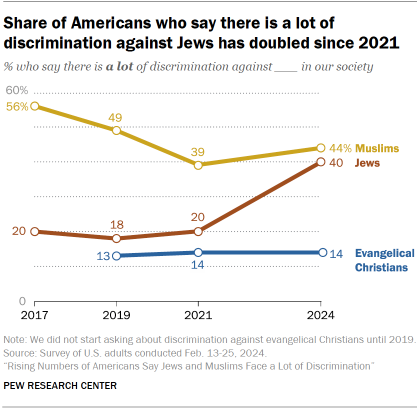
Still, it was markedly higher in 2017 than it is today. At that time – shortly after the election of former President Donald Trump and amid court battles over his effort to “ban” travel to the United States from several Muslim-majority countries – 87% said there was at least some discrimination against Muslims, including 56% who said there was a lot.
Our directly comparable trends only go back to 2017. Prior to that, Pew Research Center asked about discrimination in a slightly different way: We asked Americans on the telephone whether there was a lot of discrimination against each group in a list, using a “yes/no” format.
Using the old question, the perceived level of discrimination against Muslims was higher in 2017 than it had been in prior years (2009, 2013 and 2014). And using the new question, it has been lower in subsequent years (2019, 2021 and 2024) than it was in 2017. This does not mean, however, that 2017 was necessarily an all-time peak; to make that judgment, one would need comparable survey data going back much farther, including data from before and after the terrorist attacks of Sept. 11, 2001.
Pew Research Center has conducted three major, national surveys focusing specifically on Muslim Americans. These surveys – in 2007, 2011 and 2017 – found that the share of Muslims who said they personally had experienced discriminatory treatment in the past year grew from 40% in 2007 to 48% in 2017.
Against Jews
While the share of Americans who believe Muslims face a lot of discrimination has been relatively high for more than a decade, the share of Americans who say Jews face a lot of discrimination in our society has risen sharply in recent years.
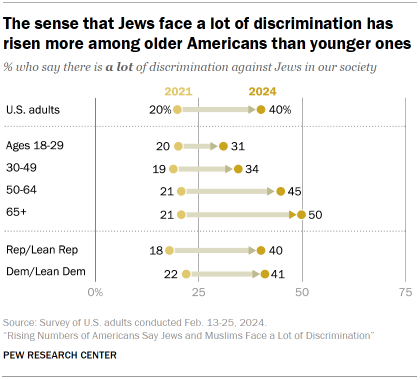
Today, 40% of U.S. adults say Jews face a lot of discrimination – twice the share who said this in 2021 (20%). While most demographic groups analyzed now say Jews face more discrimination than three years ago, opinions have shifted more markedly among some groups than others.
Most notably, among Americans ages 65 and older, the sense that Jews face a lot of discrimination has risen 29 percentage points since 2021, from 21% to 50%. Among adults ages 18 to 29, the share increased 11 points over the same period. This has opened a sizable age gap in views of discrimination against Jews, which was not present in 2021.
With the doubling in recent years, the share of the overall U.S. public saying Jews face a lot of discrimination is now identical to the share saying the same about Black people (40%) and close to the figure for Muslims (44%). By comparison, in most of our past surveys, Americans were much less likely to say there was a lot of discrimination against Jews than to say the same about other groups, including Muslims and Black people.
Pew Research Center has conducted two major, national surveys focusing specifically on Jewish Americans. Both of those surveys – in 2013 and 2020 – posed questions about discrimination against Jews and other groups. They found that while many Jews perceived anti-Jewish discrimination in the U.S., larger shares of Jews perceived a lot of discrimination against other groups.3 In 2020, for example, 48% of U.S. Jewish adults surveyed said Jews face a lot of discrimination in our society – but 60% said the same about Muslims and 54% said this about Black people.4 Today, the pattern is different: Jewish Americans are now more likely to say that Jews face a lot of discrimination in our society (72%) than to say the same about Muslims (57%) or Black people (52%).
Against evangelical Christians, racial and ethnic groups
Perceptions of discrimination against evangelical Christians have been stable across our surveys in recent years – and the share saying this remains relatively low.
There also has not been much change in views of discrimination against Black, Hispanic, Asian and White people in the past few years.
How the American public thinks discrimination has changed since the start of the Israel-Hamas war
In addition to asking survey respondents how much discrimination various groups face in our society, the new survey asked whether discrimination against three groups – Muslims, Jews and Arab people – has increased, decreased or stayed about the same since the start of the Israel-Hamas war.
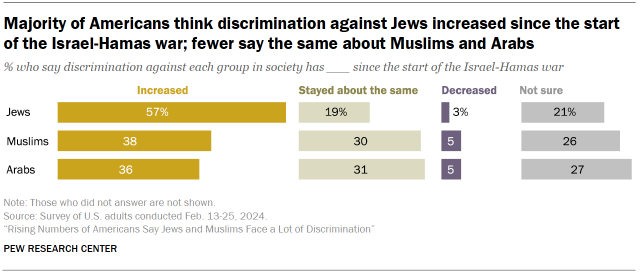
A majority of Americans (57%) say that discrimination against Jews has increased since the start of the Israel-Hamas war, while 19% say it has stayed the same and 3% say it has decreased. Around one-in-five are not sure.
Meanwhile, 38% say discrimination against Muslims has increased since the start of the war, while 30% see no change, 5% say it has decreased and around a quarter are not sure.
Views of discrimination against Arabs are roughly similar to views about Muslims: 36% of U.S. adults say discrimination against Arab people has increased since the war began, while 31% say it has stayed the same, 5% say it has decreased and 27% are not sure.
Age
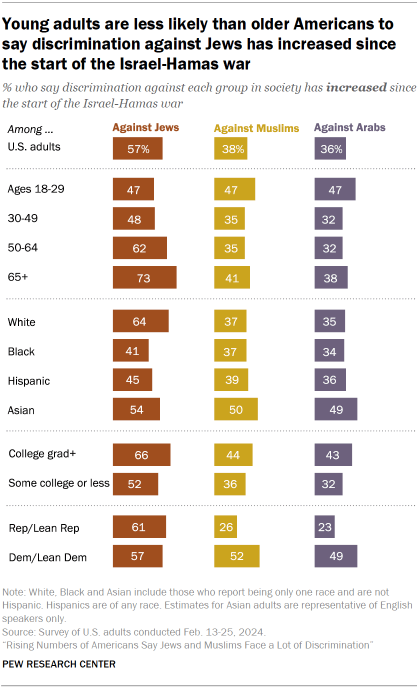
U.S. adults under 30 are about equally likely to say that discrimination has increased against Muslims, Jews and Arabs since the start of the Israel-Hamas war (47% say this about each).
These young adults are more likely than older Americans to say that discrimination against Muslims and Arabs has increased, and less likely than older Americans to say the same about Jews.
Among adults ages 65 and older, a significantly larger share say discrimination against Jews has increased since the start of the Israel-Hamas war (73%) than say the same about Muslims (41%) or Arabs (38%).
Partisanship
Americans aligned with both parties largely agree that discrimination against Jews has increased: 57% of Democrats and Democratic-leaning independents express this view, as do 61% of Republicans and Republican leaners.
But there are significant partisan differences when it comes to whether Muslims and Arabs have experienced more discrimination since the start of the war.
Democrats are about twice as likely as Republicans to say that discrimination has risen against Muslims (52% vs. 26%) and Arab people (49% vs. 23%). Among Republicans, a plurality say that discrimination has stayed the same in the case of both Muslims (41%) and Arab people (42%), and only about one-in-ten or fewer say discrimination against either group has decreased.
Religion
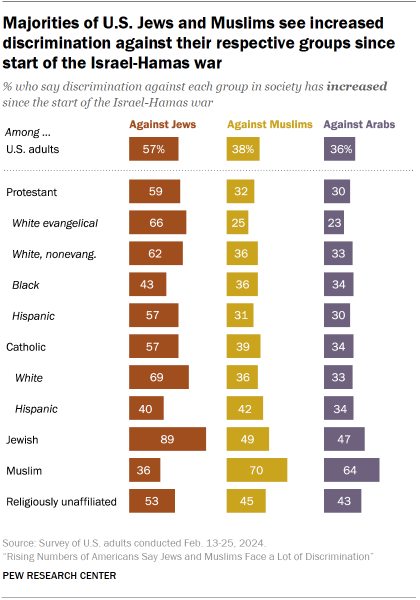
Religious groups differ in their perceptions of how discrimination has changed since the start of the Israel-Hamas war.
The vast majority of Jewish Americans (89%) think discrimination against Jews has increased since the start of the war. This is the highest share of any religious group we analyzed – although smaller majorities of White evangelical Protestants (66%), White Catholics (69%), White nonevangelical Protestants (62%) say the same. Fewer Muslim Americans agree (36%).
A large majority of Muslim Americans (70%) say discrimination against Muslims has increased since the start of the Israel-Hamas war. Around half of Jews (49%) share this view, while fewer Christians in any of the broad groups we can analyze – including White Catholics (36%) and Hispanic Catholics (42%) – agree. White evangelical Protestants (25%) are among the least likely of the religious groups studied to say that discrimination against Muslims has increased.
Views of discrimination against Arabs largely mirror views about Muslims.
How perceptions of increased discrimination since the conflict began vary based on people’s experiences with the Israel-Hamas war
As part of this survey, we asked Americans how closely they are following news about the Israel-Hamas war.
- Those who say they closely follow news about the war are more likely than those who don’t to perceive a rise in discrimination against all three groups (Muslims, Arabs and Jews) since the start of the war.
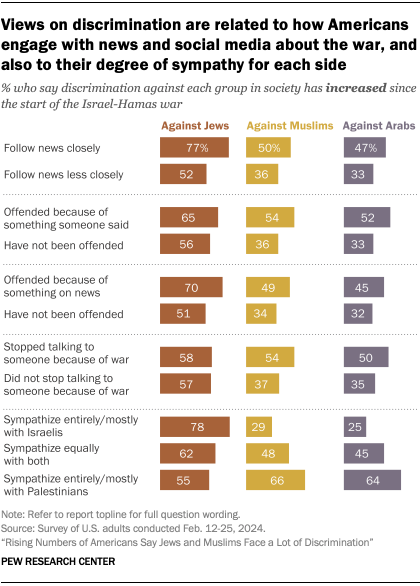
The survey also asked whether respondents have ever been personally offended by comments about the war – either because of something they saw on the news or social media, or because of something someone said around them.
- People who say they have been offended are more likely than those who haven’t to perceive a rise in discrimination against all three groups.
Some Americans also reported that they have stopped talking to someone, or unfollowed or blocked someone online, because of something that person said about the Israel-Hamas war. (For more about this, read Chapter 2 of this report.)
- People who have cut off communication with someone in this way are more likely than those who haven’t to say discrimination against both Muslims and Arabs has increased.
Where people say their sympathies lie in the Israel-Hamas war is also related to their perceptions about discrimination in the U.S.
- 78% of those who sympathize entirely or mostly with the Israeli people say discrimination against Jews has increased. Fewer say this among those who sympathize entirely or mostly with the Palestinian people (55%) or who sympathize equally with both groups (62%).
- By comparison, those who sympathize entirely or mostly with the Palestinian people are more likely to say discrimination against Muslims (66%) and Arabs (64%) has increased. Fewer of those who sympathize predominantly with Israelis (29% and 25%, respectively) or equally with both groups (48% and 45%, respectively) say the same.


